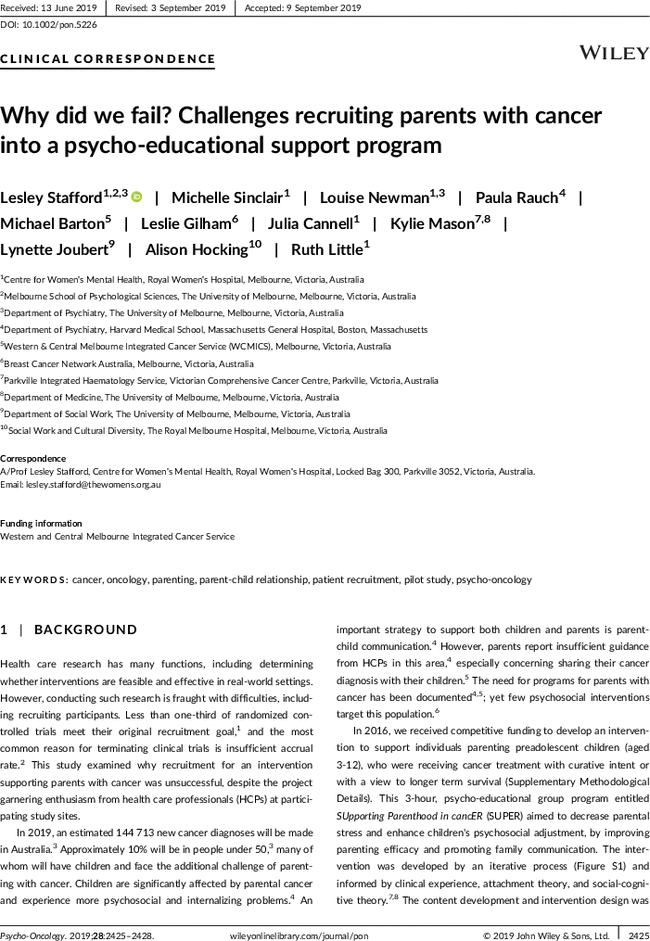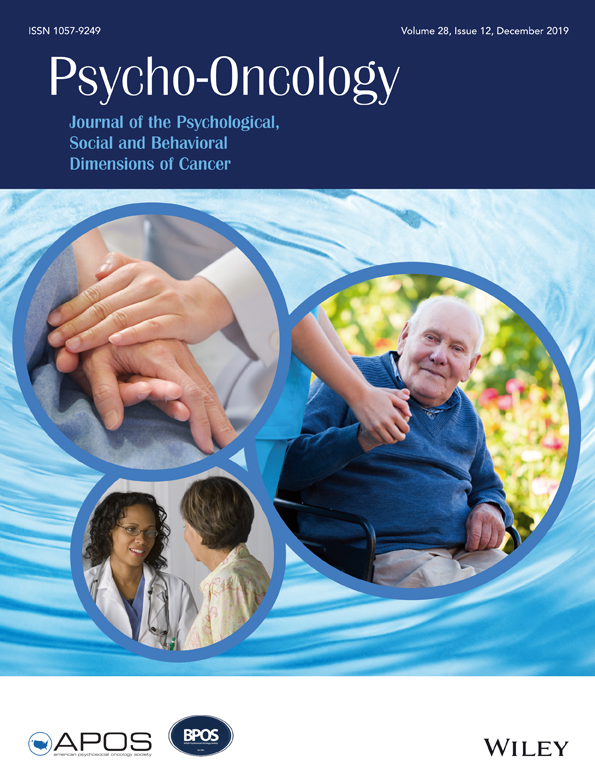Why did we fail? Challenges recruiting parents with cancer into a psycho-educational support program
Corresponding Author
Lesley Stafford
Centre for Women's Mental Health, Royal Women's Hospital, Melbourne, Victoria, Australia
Melbourne School of Psychological Sciences, The University of Melbourne, Melbourne, Victoria, Australia
Department of Psychiatry, The University of Melbourne, Melbourne, Victoria, Australia
Correspondence
A/Prof Lesley Stafford, Centre for Women's Mental Health, Royal Women's Hospital, Locked Bag 300, Parkville 3052, Victoria, Australia.
Email: [email protected]
Search for more papers by this authorMichelle Sinclair
Centre for Women's Mental Health, Royal Women's Hospital, Melbourne, Victoria, Australia
Search for more papers by this authorLouise Newman
Centre for Women's Mental Health, Royal Women's Hospital, Melbourne, Victoria, Australia
Department of Psychiatry, The University of Melbourne, Melbourne, Victoria, Australia
Search for more papers by this authorPaula Rauch
Department of Psychiatry, Harvard Medical School, Massachusetts General Hospital, Boston, Massachusetts
Search for more papers by this authorMichael Barton
Western & Central Melbourne Integrated Cancer Service (WCMICS), Melbourne, Victoria, Australia
Search for more papers by this authorLeslie Gilham
Breast Cancer Network Australia, Melbourne, Victoria, Australia
Search for more papers by this authorJulia Cannell
Centre for Women's Mental Health, Royal Women's Hospital, Melbourne, Victoria, Australia
Search for more papers by this authorKylie Mason
Parkville Integrated Haematology Service, Victorian Comprehensive Cancer Centre, Parkville, Victoria, Australia
Department of Medicine, The University of Melbourne, Melbourne, Victoria, Australia
Search for more papers by this authorLynette Joubert
Department of Social Work, The University of Melbourne, Melbourne, Victoria, Australia
Search for more papers by this authorAlison Hocking
Social Work and Cultural Diversity, The Royal Melbourne Hospital, Melbourne, Victoria, Australia
Search for more papers by this authorRuth Little
Centre for Women's Mental Health, Royal Women's Hospital, Melbourne, Victoria, Australia
Search for more papers by this authorCorresponding Author
Lesley Stafford
Centre for Women's Mental Health, Royal Women's Hospital, Melbourne, Victoria, Australia
Melbourne School of Psychological Sciences, The University of Melbourne, Melbourne, Victoria, Australia
Department of Psychiatry, The University of Melbourne, Melbourne, Victoria, Australia
Correspondence
A/Prof Lesley Stafford, Centre for Women's Mental Health, Royal Women's Hospital, Locked Bag 300, Parkville 3052, Victoria, Australia.
Email: [email protected]
Search for more papers by this authorMichelle Sinclair
Centre for Women's Mental Health, Royal Women's Hospital, Melbourne, Victoria, Australia
Search for more papers by this authorLouise Newman
Centre for Women's Mental Health, Royal Women's Hospital, Melbourne, Victoria, Australia
Department of Psychiatry, The University of Melbourne, Melbourne, Victoria, Australia
Search for more papers by this authorPaula Rauch
Department of Psychiatry, Harvard Medical School, Massachusetts General Hospital, Boston, Massachusetts
Search for more papers by this authorMichael Barton
Western & Central Melbourne Integrated Cancer Service (WCMICS), Melbourne, Victoria, Australia
Search for more papers by this authorLeslie Gilham
Breast Cancer Network Australia, Melbourne, Victoria, Australia
Search for more papers by this authorJulia Cannell
Centre for Women's Mental Health, Royal Women's Hospital, Melbourne, Victoria, Australia
Search for more papers by this authorKylie Mason
Parkville Integrated Haematology Service, Victorian Comprehensive Cancer Centre, Parkville, Victoria, Australia
Department of Medicine, The University of Melbourne, Melbourne, Victoria, Australia
Search for more papers by this authorLynette Joubert
Department of Social Work, The University of Melbourne, Melbourne, Victoria, Australia
Search for more papers by this authorAlison Hocking
Social Work and Cultural Diversity, The Royal Melbourne Hospital, Melbourne, Victoria, Australia
Search for more papers by this authorRuth Little
Centre for Women's Mental Health, Royal Women's Hospital, Melbourne, Victoria, Australia
Search for more papers by this authorFunding information: Western and Central Melbourne Integrated Cancer Service

CONFLICT OF INTEREST
This manuscript has not been published and is not under consideration for publication elsewhere. The authors have full control of the primary data and agree to allow the journal to review the data upon request. We have no conflicts of interest to disclose.
Supporting Information
| Filename | Description |
|---|---|
| pon5226-sup-0001.docxWord 2007 document , 58.6 KB |
Figure S1. Iterative development of the SUPER intervention Figure S2. Consort flow diagram for SUPER study referrals. Table S1. Topics covered during the SUPER program and resources provided (adapted from the SUPER facilitator's manual) Table S2. Descriptive statistics of the health care professionals who provided evaluation and feedback |
Please note: The publisher is not responsible for the content or functionality of any supporting information supplied by the authors. Any queries (other than missing content) should be directed to the corresponding author for the article.
REFERENCES
- 1McDonald AM, Knight RC, Campbell MK, et al. What influences recruitment to randomised controlled trials? A review of trials funded by two UK funding agencies. Trials. 2006; 7(1): 9.
- 2Williams RJ, Tse T, DiPiazza K, Zarin DA. Terminated trials in the ClinicalTrials.gov results database: evaluation of availability of primary outcome data and reasons for termination. PLoS ONE. 2015; 10(5):e0127242.
- 3 Australian Institute of Health and Welfare. Cancer in Australia 2019. Cancer series no.119. Cat. no. CAN 123. Canberra: AIHW; 2019: 42.
- 4Morris JN, Martini A, Preen D. The well-being of children impacted by a parent with cancer: an integrative review. Support Care Cancer. 2016; 24(7): 3235-3251.
- 5Tavares R, Brandao T. Mothers with breast cancer: a mixed-method systematic review on the impact on the parent-child relationship. Psychooncology. 2018; 27(2): 367-375.
- 6Inhestern L, Haller AC, Wlodarczyk O, Bergelt C. Psychosocial interventions for families with parental cancer and barriers and facilitators to implementation and use—a systematic review. PLoS ONE. 2016; 11(6):e0156967.
- 7 Ainsworth MAaBJ. An ethological approach to personality development. Am Psychol. 1991; 46: 331-341.
- 8Bandura A. Social foundations of thought and action: a social cognitive theory. Englewood Cliffs, New Jersey: Prentice Hall; 1986.
- 9Braun V, Clarke V. Using thematic analysis in psychology. Qual Res Psychol. 2006; 3(2): 77-110.
10.1191/1478088706qp063oa Google Scholar
- 10Jennings S, Philip EJ, Nelson C, et al. Barriers to recruitment in psycho-oncology: unique challenges in conducting research focusing on sexual health in female survivorship. Psychooncology. 2014; 23(10): 1192-1195.
- 11van Lankveld J, Fleer J, Schroevers MJ, Sanderman R, den Oudsten BL, Dekker J. Recruitment problems in psychosocial oncology research. Psychooncology. 2018; 27(9): 2296-2298.
- 12Rush ALR, Carpenter JE, Carter C, Searles A, Byrne JA. Research governance review of a negligible-risk research project: too much of a good thing? Res Ethics. 2018; 14(3): 1-12.
10.1177/1747016117739937 Google Scholar
- 13Semple CJ, McCance T. Parents' experience of cancer who have young children: a literature review. Cancer Nurs. 2010; 33(2): 110-118.
- 14Young F, Davey M. Pilot feasibility study: eliciting provider and patient perspectives to help African American families cope with parental cancer. J Clin Oncol. 2014; 32(31_suppl): 233.
10.1200/jco.2014.32.31_suppl.233 Google Scholar
- 15Andrykowski MA, Manne SL. Are psychological interventions effective and accepted by cancer patients? I. Standards and levels of evidence. Ann Behav Med. 2006; 32(2): 93-97.




